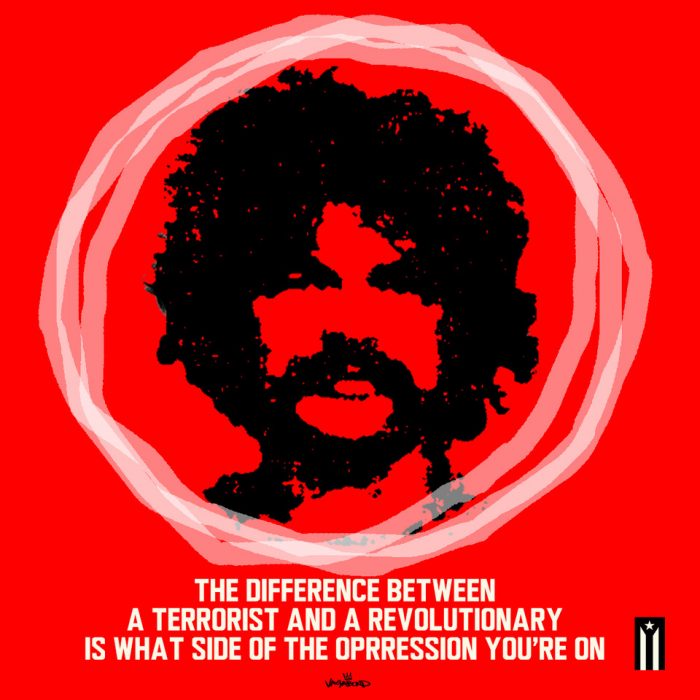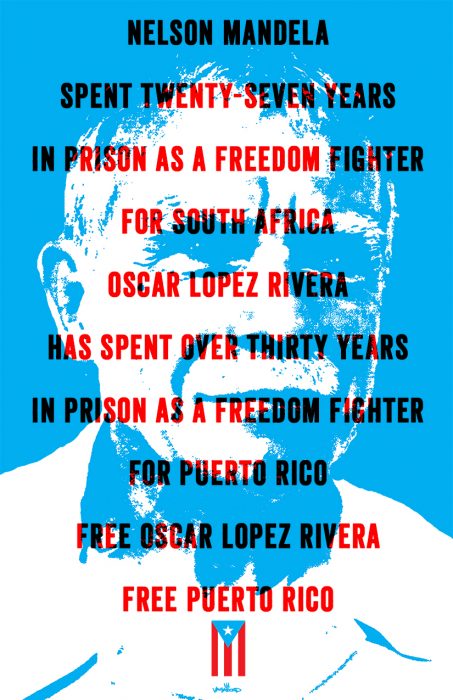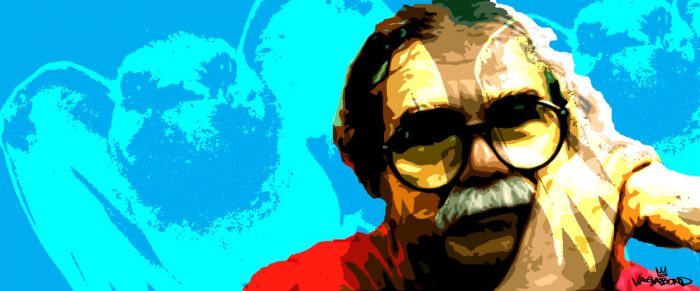On January 17, 2017, a few days before former President Barak Obama left office, he pardoned Oscar López Rivera, a U.S.-held Puerto Rican political prisoner of war who spent 35 years in prison for fighting U.S. colonialism in Puerto Rico.
What is a Puerto Rican political prisoner of war?
Puerto Rico is a colony of the U.S. and has been since 1898, and before that, it was a colony of Spain for about 400 years. There has been a long and rich history of resistance to both Spanish and U.S. colonial foreign rule in Puerto Rico. In the 1970’s and 1980’s, Oscar was a part of the FALN (Fuerzas Armadas de Liberación Nacionalista), the Armed Forces of National Liberation, a clandestine revolutionary movement to usurp U.S. colonial rule in Puerto Rico by any and all means necessary.
On May 29, 1981, Oscar was arrested and charged with use of force to commit robbery; interstate transportation of firearms and ammunition to aid in the commission of a felony; and seditious conspiracy to overthrow the U.S. government. During the trial, he took a prisoner of war status, and defined himself as an anti-colonial fighter in an anti-colonial struggle and refused to recognize the U.S. courts as having any legal power to prosecute him under international law.
After World War II, many colonized nations sought independence, and the United Nations took up the issue in resolution 1514, Declaration on the Granting of Independence to Colonial Countries and Peoples, which stated that the colonized have the right to seek independence in any way that the colonized see fit. In 1960, when resolution 1514 went to a vote, nine nations abstained. The U.S was one of those nine nations.
And despite his radical stance (or perhaps even because of it), Oscar was found guilty and sentenced to 55 years in prison. In 1988, he was once again found guilty of planning a prison escape and sentenced to another 15 years. Oscar was supposed to a serve a total of 70 years in prison.
Thirty-five years into that sentence, on May 17, 2017, Oscar was set free, after a long and protracted international struggle that included demands from as disparate as Puerto Rican pop star Ricky Martin, Bishop Desmond Tutu, Fidel Castro, as well as former U.S. Presidents Jimmy Carter and Bill Clinton. For the most part, the Puerto Rican diaspora was ecstatic with the news that Oscar was free. The pardon of Oscar by Obama, however, was not without controversy. Many people who disagreed with Oscar’s pardon cited the Fraunces Tavern bombing in 1975 that killed four people and injured 40 more. Although Oscar was never charged with that bombing and it was never proven that he had anything to do with the operation, detractors to his pardon have always used that incident to further their cause in calling Oscar a terrorist.
With that controversy continuing to boil over, NYC’s National Puerto Rican Day Parade decided to honor Oscar, and with that, the debate over whether Oscar is a terrorist or revolutionary has drawn battles lines both inside the Puerto Rican diaspora and outside of it.
Goya, a major sponsor of the parade since its inception 60 years ago, pulled out because it believed Oscar was a terrorist. Other corporate entities followed Goya’s move: the New York Yankees, JetBlue, The Daily News, WNBC, Univision, Telemundo, AT&T, McDonald’s, to name a few. Many of these corporations claimed that whatever money is going to the parade will go toward college scholarships for Puerto Rican students.
The redirection of corporate support of the parade to scholarships sounds nice, but if you follow that line of thinking through to the end, then Oscar López Rivera “the terrorist” will have helped a lot of young Puerto Ricans go to college. And if you know Oscar’s history, then you’ll know that this isn’t the first time he’s helped educate young Puerto Ricans. After he came back to from the Vietnam War, where he received the Bronze Star for his heroic actions in battle, Oscar was appalled by the racism that Puerto Ricans faced. Not one to idly stand, he set about founding La Escuelita Puertorriqueña in Chicago, which became the Dr. Pedro Albizu Campos High School and the Juan Antonio Corretjer Puerto Rican Cultural Center.
Another Parade
The parade’s corporate sponsors have created another kind of parade—as a long line forms of those who refuse to be seen supporting a so-called “Puerto Rican terrorist” march to the podium, making grand statements about wanting to support the Puerto Rican people but not wanting to support “terrorism.” That kind of parade wouldn’t be complete without the State and its military apparatus—the NYPD. Not to be upstaged by corporations, the NYPD Hispanic Society won’t march in the parade. The NYPD Dominican Officers followed suit, as well as the NYPD Police Benevolent Association. Not to be outdone, NYPD Commissioner James O’Neil also said that he will now not honor the parade with his presence.
All because of Oscar.
This second parade of pompous self-righteous abandonment of the Puerto Rican Day Parade wouldn’t be complete without politicians. New York governor Andrew Cuomo said he won’t march but won’t give a reason why. New York state attorney general Eric Schneiderman, state comptroller Thomas DiNapoli and senator Charles Schumer won’t attend. Why this new parade of pompous self-righteous abandonment? Because the way in which one defines a “terrorist” or a “revolutionary” depends on what side of the oppression you’re on.
Nelson Mandela was a “terrorist” to the South African apartheid government. To Black South Africans struggling for freedom and white people who supported that struggle, Nelson Mandela was a “revolutionary.” People forget that Mandela used violence as a means towards the liberation of Black people in South Africa. It’s how he was wound up in prison for 27 years.
However, to his supporters in South Africa and to the rest of the world that called for his freedom, Mandela was a “revolutionary.” The South African government was forced to free Nelson Mandela by a popular people’s movement, both within South Africa and internationally.
When Mandela was finally liberated, he was given a hero’s welcome. People recognized that the apartheid system was a form of internal colonization, and colonization is something that most freedom-loving people recognize as being inherently wrong. And when Nelson Mandela came to New York, the politicians lined up for the photo ops while the NYPD remained completely silent on his use of violence. The corporations that refused to take a part of the international call to boycott South Africa over apartheid also hoped no one would notice that they continued to financially benefit from the internal colonization of the apartheid system.
Back to the Community?
To the credit of the Board of Directors of the National Puerto Rican Parade, it has refused to buckle under the pressure, issuing a statement that clearly stated that the boycotts by both corporate and state entities would not sway them in honoring Oscar.
The NYPD Patrolmen’s Benevolent Association’s (PBA) issued a statement deciding not to participate in the largest celebration of Puerto Rican diversity in its 60th Anniversary because we are honoring Oscar López Rivera. This statement was confusing and incomprehensible, since they have not joined the Parade as a contingent ever. NYPD has and we urge them to do so this year.
Over the years, several New York City parades have honored leaders who elicit mixed reaction. We all remember the St. Patrick’s Day Parade of 1983, when IRA leader, Michael Flannery of Queens, was chosen as Grand Marshal of the event. Although public opinion was divided, New York went ahead and celebrated Irish heritage. We all worked through the LGBT controversy of 1990, and the differences that arose with the Fire Department of New York in 2007. During these crucial times, the Big Apple’s Irish American community, organized advocacy groups, public figures, and parade organizers, addressed their differences. In the end, unity prevailed and a great celebration of culture and pride took place each time.
This upcoming June 11, on New York’s iconic Fifth Avenue, the National Puerto Rican Day Parade will display a celebration full of cultural diversity and pride. The Parade will continue to serve as educational platform, as it works alongside the community in a productive and positive manner. It will celebrate 100 outstanding young people who will receive the Parade’s scholarships. And yes, it will create awareness on issues, even if controversial, that affect us as a Puerto Rican community like the commutation of Oscar López Rivera’s sentence after 35 years in jail, a journey we began in 2014 with an awareness and solidarity campaign for his cause.
PBA’s decision belongs to them; Goya’s corporate decision belongs to them. We understand that others may not be able to be with us. However, we will continue to represent all voices, with an aim to spark dialogue and find common ground, so that we can help advance our community and build cultural legacy.
The Board of Directors of the
National Puerto Rican Day Parade
Monday, May 22, 2017
On May 23, the board issued yet another statement that essentially said the same thing.
Many people are shocked by the controversy that Oscar is being honored, perhaps even more shocked than when President Obama had actually commuted his sentence. This controversy has supporters of Oscar threatening to boycott those corporations that pulled their support. It also has the NYPD commissioner calling for police to boycott any corporations who continue to support the parade in an effort to get those corporations to withdraw their support.
Lines have been drawn, but how else was this supposed to play out? Oscar López Rivera is a revolutionary, a freedom fighter who wants to free Puerto Rico from U.S. colonial rule, which oddly enough manifests itself corporately, militarily and politically. So it’s no surprise that corporations, military organizations (like the NYPD) and politicians don’t want any part of a parade that honors a man who is the antithesis of everything they stand for. Don’t be fooled into thinking that this is about “terrorism” or by the rhetoric of politicians who make internal colonialism possible with the NYPD so that corporations can reap the financial benefits. Puerto Rican communities in NYC have been ravaged by gentrification in Williamsburg, in the South Bronx, in East Harlem, in Park Slope, in Sunset Park and in the Lower East Side—spearheaded by politicians in service to corporate real estate who use the NYPD to “clean up” neighborhoods with tactics as small as “stop and frisk” and as great as brutality and murder.
These tactics aren’t just being applied to NYC. The Puerto Rican Day Parade is a celebration in exile because those very same tactics have been used in the past, forcing Puerto Ricans to leave the island to come to the U.S. Those tactics are being employed in Puerto Rico as the colony faces a massive $74 billion debt crisis, brought on by U.S. colonialism, served up by politicians (both in the U.S. and in Puerto Rico) once again in service to U.S. corporate interests and using militarization to quell the protests that will accompany the draconian measures being dropped onto Puerto Ricans. Wall Street hedge funds, who bought up Puerto Rico’s debt for pennies on the dollar, now claim that Puerto Rico owes $74 billion dollars in loans and they want “their” money now. Wall Street has demanded austerity in Puerto Rico and the U.S.-controlled colonial Puerto Rican government has begun instituting such measures, closing schools, hospitals and cutting back on social services.
Rising From Scandal
For most of its 60-year history, the parade has been a very conservative pro-politician, pro-corporate, pro-military event. A few years ago, a scandal shook the parade with investigations into how it was run, with over a million dollars being embezzled to enrich organizers. The parade almost didn’t survive, as many of its key organizers were forced to resign in shame and a new board was formed by Schneiderman, the same attorney general who won’t attend the 2017 parade. This was an important development because if that shake up with the organizers hadn’t happened, then we probably wouldn’t be facing this issue. The previous parade organizers were much more concerned with keeping corporate sponsors happy than about the concerns of Puerto Ricans.
However, even before this scandal, many Puerto Ricans felt that the parade was more about an opportunity for corporations to market and sell to Puerto Ricans than it was a celebration of a people. As a result, many Puerto Ricans in the New York City area who had been disgruntled about the direction of the parade, gathered to meet seeing an opportunity to reclaim the parade and bring the focus back on to Puerto Ricans. The parade took its mission much more seriously. In 2013, an Oscar López Rivera float demanding his liberation marched in the parade. In 2014, the parade organizers launched an outreach program in support of Oscar’s freedom. Now in 2017, Oscar is free and it would only make sense that the parade honor him, since it did make an effort to free him.
This is how it’s supposed to be. It’s the right of a people to decide who their heroes are and who they will honor. The politicians and the corporations and the NYPD aren’t used to Puerto Ricans dictating terms. For a very long time, organizers fostered the attitude of allowing the parade to be something that put the concerns of corporations and politicians and the NYPD ahead of their responsibility to serving the Puerto Rican community, as long as they were allowed to enrich themselves in the process.
It seems that’s all come to an end. After all, it’s the Puerto Rican Day Parade not the JetBlue, Goya, AT&T, Daily News, NBC, Univision, NYPD, Governor Cuomo Parade for Puerto Ricans. Those entities don’t get to dictate who we are and what we want and who we will decide to honor. That’s not how this works. We Puerto Ricans have a parade, and if you want to support that then we’re glad to have you, but don’t confuse past colonial practices of bending towards your will for your ability to infringe upon our sovereignty as a people, even if our island nation still continues to be U.S. colony.
The difference between a “terrorist” and a “revolutionary” is what side of the oppression you’re on.
Oscar López Rivera is a symbol of Puerto Rican defiance, a symbol of resistance to U.S. colonialism, and if U.S. politicians, U.S. corporations and U.S. military outfits like the NYPD benefit from U.S. colonialism both internally (as in the gentrification of Puerto Rican neighborhoods in New York City) and externally (as in the colonization of Puerto Rico), then how do they not take offense?
Isn’t it obvious what the issue really is?
These entities are threatened by Oscar and his ideals.
These entities are abandoning the parade because Oscar’s ideals may just be become the ideals of a majority of Puerto Ricans and the shift of power from the colonizer to the colonized might be shifting in favor of what could quickly become a relationship in which both sides are decolonized.
The question isn’t whether or not Oscar Lopez Rivera is a “terrorist” or a “revolutionary.” The question is—what side of the oppression are you on?
***
vagabond is an artist, writer and filmmaker. He’s worked in the Puerto Rican independence movement since 1997. His graphic design work and writing have been featured in Blu Magazine, AWOL, SALVO, Centro The Journal For Puerto Rican Studies, Left Turn and Liberator Magazine. His first feature film, MACHETERO, about the ongoing struggle for Puerto Rican independence, has won awards in South Africa, Wales, England, Thailand, Ireland and New York. He’s currently producing and directing Harlem’s Last Poet, a documentary on the life of Abiodun Oyewlole, a founding member of The Last Poets, who served time in prison for robbing the KKK.





